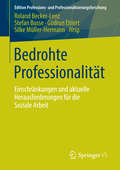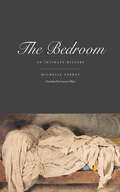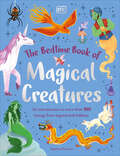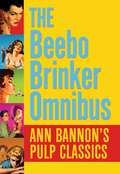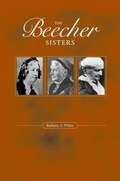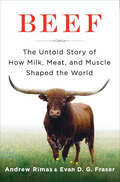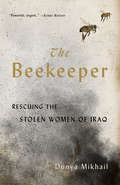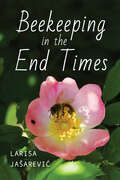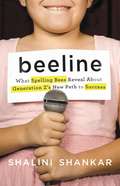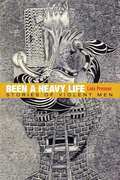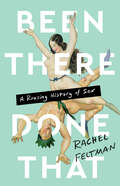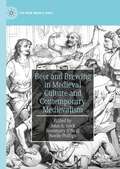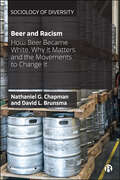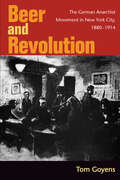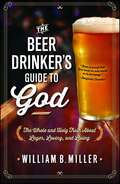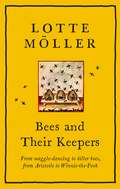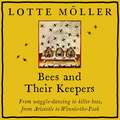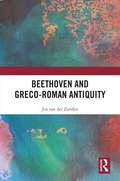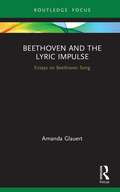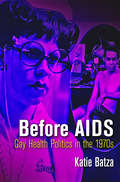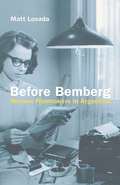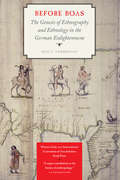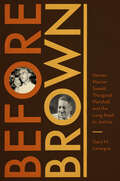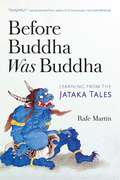- Table View
- List View
Bedrohte Professionalität: Einschränkungen und aktuelle Herausforderungen für die Soziale Arbeit (Edition Professions- und Professionalisierungsforschung #3)
by Roland Becker Lenz Stefan Busse Gudrun Ehlert Silke Müller-HermannWelche Konstellationen, Probleme und Entwicklungen können Professionalität in der Sozialen Arbeit einschränken oder bedrohen? Unter dieser Fragestellung greifen die Beiträge des Bandes einen bisher nur selten fokussierten Aspekt der Professionsforschung auf. Aus der Breite des gesamten Handlungsfeldes werden Beispiele gezeigt, in denen problematische und letztlich störende Auswirkungen auf professionelles Handeln festzustellen sind. Bedrohungen und Einschränkungen werden in vielfältiger Weise in Bereichen wie Schulsozialarbeit, Familienarbeit, Erwachsenenpsychiatrie und Jugendhilfe dargestellt und analysiert.
Bedroom: An Intimate History
by Lauren Elkin Michelle PerrotAn erudite and highly enjoyable exploration of the most intriguing of personal spaces, from Greek and Roman antiquity through today The winner of France’s prestigious Prix Femina Essai (2009), this imaginative and captivating book explores the many dimensions of the room in which we spend so much of our lives—the bedroom. Eminent cultural historian Michelle Perrot traces the evolution of the bedroom from the time of the ancient Greeks and Romans to today, examining its myriad forms and functions, from royal king’s chamber to child’s sleeping quarters to lovers’ trysting place to monk’s cell. The history of women, so eager for a room of their own, and that of prisons, where the principal cause of suffering is the lack of privacy, is interwoven with a reflection on secrecy, walls, the night and its mysteries. Drawing from a wide range of sources, including architectural and design treatises, private journals, novels, memoirs, and correspondences, Perrot’s engaging book follows the many roads that lead to the bedroom—birth, sex, illness, death—in its endeavor to expose the most intimate, nocturnal side of human history.
The Bedtime Book of Magical Creatures: An Introduction to More than 100 Creatures from Legend and Folklore (The Bedtime Books)
by Stephen KrenskySay hello to more than 100 of your favorite magical creatures with this delightful, illustrated introduction.This is the must-have bedtime book about the world's most fantastical creatures from around the world. Turn each page to find out more about the amazing variety of magical creatures—from fairies and mermaids to dragons and unicorns.With charming illustrations, storybook text, and key terms highlighted on each page, this book is a wonderful and comprehensive introduction to magical creatures. The book showcases beings from land, water, and air, in three comprehensive chapters. Many pages are devoted to a particular creature, with others featuring a collection of similar beings, such as witches and genies, giving bite-sized chunks of accessible information to help early learners get to know more about their favourite creature from myths, legends, and story books. There are also reference pages at the end of the book that give more information on the context and origins of each creature.A timeless gift book, The Bedtime Book of Magical Creatures will be treasured for years to come.
The Beebo Brinker Omnibus: Ann Bannon's Pulp Classics
by Ann BannonDesignated the "queen of lesbian pulp fiction" for authoring five landmark novels, Ann Bannon's work defined lesbian fiction for the pre-Stonewall generation. Unlike many writers of the period, however, Bannon broke through the shame and isolation typically portrayed in lesbian pulps, offering instead women characters who embrace their sexuality against great odds. With Beebo Brinker, Bannon introduces the title character, a butch 17-year-old farm girl newly arrived in New York after she is driven from her Wisconsin home town for wearing drag to the State Fair. Befriended by the gay Jack Mann, a father figure with a weakness for runaways, Beebo sets out to find love. She never knew what she wanted -- until she came to Greenwich Village and found the love that smolders in the shadows of the twilight world. The 880-page Beebo Brinker Omnibus includes the novels Beebo Brinker, I Am a Woman, Journey to a Woman, Odd Girl Out, and Women in the Shadows. Sexy, dangerous, and often touching, the paperbacks sold millions. Chronicling the reality of 1950s lesbian life, Beebo Brinker is an astounding and engaging read.
The Beecher Sisters
by Barbara Anne WhiteThe Beecher sisters--Catharine, Harriet, and Isabell A&M were three of the most prominent women in nineteenth-century America. Daughters of the famous evangelist Lyman Beecher, they could not follow their father and seven brothers into the ministry. Nonetheless, they carved out pathbreaking careers for themselves. Catharine Beecher founded the Hartford Female Seminary and devoted her life to improving women's education. Harriet Beecher Stowe became world famous as the author of Uncle Tom's Cabin. Isabella Beecher Hooker was an outspoken advocate for women's rights. This engrossing book is a joint biography of the sisters, whose lives spanned the full course of the nineteenth century. The life of Isabella Beecher--who has never been the subject of a biography--is examined in particular detail here. Drawing on little used sources, Barbara White explores Isabella's political development and her interactions with her sisters and with prominent people of the time--from Susan B. Anthony and Elizabeth Cady Stanton,to Mark Twain.
Beef: The Untold Story of How Milk, Meat, and Muscle Shaped the World
by Andrew Rimas Evan D. FraserThe cow. The most industrious animal in the world. A beast central to human existence since time began, it has played a vital role in our history not only as a source of food, but also as a means of labor, an economic resource, an inspiration for art, and even as a religious icon. Prehistoric people painted it on cave walls; explorers, merchants, and landowners traded it as currency; many cultures worshipped it as a god. So how did it come to occupy the sorry state it does today—more factory product than animal?In Beef, Andrew Rimas and Evan D. G. Fraser answer that question, telling the story of cattle in its entirety. From the powerful auroch, a now extinct beast once revered as a mystical totem, to the dairy cows of seventeenth-century Holland to the frozen meat patties and growth hormones of today, the authors deliver an engaging panoramic view of the cow's long and colorful history.Peppered with lively anecdotes, recipes, and culinary tidbits, Beef tells a story that spans the globe, from ancient Mediterranean bullfighting rings to the rugged grazing grounds of eighteenth-century England, from the quiet farms of Japan's Kobe beef cows to crowded American stockyards to remote villages in East Africa, home of the Masai, a society to which cattle mean everything. Leaving no stone unturned in its exploration of the cow's legacy, the narrative serves not only as a compelling story but as a call to arms, offering practical solutions for confronting the current condition of the wasteful beef and dairy industries. Beef is a captivating history of an animal whose relationship with humanity has shaped the world as we know it, and readers will never look at steak the same way again.
The Beekeeper: Saving The Stolen Women Of Iraq
by Dunya Mikhail Max Weiss<P>The true story of a beekeeper who risks his life to rescue enslaved women from Daesh <P>Since 2014, Daesh (ISIS) has been brutalizing the Yazidi people of northern Iraq: sowing destruction, killing those who won’t convert to Islam, and enslaving young girls and women. <P>The Beekeeper, by the acclaimed poet and journalist Dunya Mikhail, tells the harrowing stories of several women who managed to escape the clutches of Daesh. <P>Mikhail extensively interviews these women—who’ve lost their families and loved ones, who’ve been sexually abused, psychologically tortured, and forced to manufacture chemical weapons—and as their tales unfold, an unlikely hero emerges: a beekeeper, who uses his knowledge of the local terrain, along with a wide network of transporters, helpers, and former cigarette smugglers, to bring these women, one by one, through the war-torn landscapes of Iraq, Syria, and Turkey, back into safety. <P>In the face of inhuman suffering, this powerful work of nonfiction offers a counterpoint to Daesh’s genocidal extremism: hope, as ordinary people risk their own lives to save those of others.
Beekeeping in the End Times
by Larisa JašarevićEvery hundred years, as the story goes, two angels wonder out loud whether the bees are still swarming. For as long as the bees are swarming, the angels are reassured, the world holds together. Still, the tale suggests, the angels live in anxious anticipation of the End. Local beekeepers in Bosnia and Herzegovina retell the old tale with growing unease, as their honeybees weather the ground effects of climate change.Beekeeping in the End Times relates extreme weather events and quieter disasters that have been altering honey ecologies across Bosnia and Herzegovina since 2014. While world-wide endangerment of pollinators, and bees in particular, has been the subject of much global concern, effects of climate change on the indispensable honeybees,remain understudied. Drawing on a five-year long study, the book suggests that local apiarists' field observations resonate with many climate biologists' concerns and speculations about the future of plant-bee relations on the warming planet. Local practice also adds to the record complex and puzzling trends that make honey scarce in otherwise lush, biodiverse landscapes.To Bosnian Muslims, honeybees are more than pollinators. They are inspired beings whose honey is another form of divinely revelation. To appreciate the meaning of honeybees and to grasp the dire ecological catastrophe underway, Jašarević reads contemporary environmental writings and Sufi texts, she listens to the seasoned beekeepers and collects local wisdom tales. From start to finish, Jašarević pores over key Islamic texts, the Quran and the Hadith, and their popular retellings. The Islamic end-times lore, the book proposes, holds surprising lessons on how to live and strive in the 'not yet,' stalling the apocalypse.
Beeline: What Spelling Bees Reveal About Generation Z's New Path to Success
by Shalini ShankarAn anthropologist uses spelling bees as a lens to examine the unique and diverse traits of Generation Z--and why they are destined for success <P><P>At first glance, Generation Z (youth born after 1997) seems to be made up of anxious overachievers, hounded by Tiger Moms and constantly tracked on social media. One would think that competitors in the National Spelling Bee -- the most popular brain sport in America -- would be the worst off. <P><P>Counterintuitively, anthropologist Shalini Shankar argues that, far from being simply overstressed and overscheduled, Gen Z spelling bee competitors are learning crucial twenty-first-century skills from their high-powered lives, displaying a sophisticated understanding of self-promotion, self-direction, and social mobility. <P><P>Drawing on original ethnographic research, including interviews with participants, judges, and parents, Shankar examines the outsize impact of immigrant parents and explains why Gen Z kids are on a path to success.
Been a Heavy Life: Stories of Violent Men
by Lois PresserIn this groundbreaking work, Lois Presser investigates the life stories of men who have perpetrated violence. She applies insights from across the academy to in-depth interviews with men who shared their accounts of how they became the people we most fear--those who rape, murder, assault, and rob, often repeatedly. Been a Heavy Life provides the discipline of criminology with two crucial frameworks: one for critically evaluating the construction of offenders' own stories, and one for grasping the cultural meta-narratives that legitimize violence. For social scientists generally, this book offers a vivid demonstration of just how dynamic and contingent self-narratives are.
Been There, Done That: A Rousing History of Sex
by Rachel FeltmanA rollicking, myth-busting history of sex that moves from historical attempts at birth control to Hildegard von Bingen&’s treatise on the female orgasm, demystifying plenty of urban legends along the way.Roman physicians told female patients they should sneeze out as much semen as possible after intercourse to avoid pregnancy. Historical treatments for erectile dysfunction included goat testicle transplants. In this kaleidoscopic compendium of centuries-old erotica, science writer Rachel Feltman shows how much sex has changed—and how much it hasn&’t. With unstoppable curiosity, she debunks myths, breaks down stigma, and uses the long, outlandish history of sex to dissect present-day practices and taboos.Feltman&’s mischievous humor dismantles fear and brings scientific literacy to a subject surrounded by misinformation, and indeed, as it gravitates toward the strange, Been There, Done That delivers some sorely needed sex ed. Explorations into age-old questions and bizarre trivia around birth control, aphrodisiacs, STIs, courtship rituals, and more establish that, when it comes to carnal pleasures and procreation, there&’s never been a normal, and sex isn&’t something to be scared of.
Beer and Brewing in Medieval Culture and Contemporary Medievalism (The New Middle Ages)
by John A. Geck Rosemary O’Neill Noelle PhillipsBeer and Brewing in Medieval Culture and Contemporary Medievalism is a cross-cultural analysis of the role that alcohol consumption played in literature, social and cultural history, and gender roles in the Middle Ages. The volume also seeks to correct or offer new insights into historical beer production. By drawing on the expertise of scholars of history, archaeology, Old and Middle English, Old Norse, and Medieval and Early Modern literature, the book shows how historical medieval beer and brewing has influenced nostalgic post-medieval nationalism and romanticized visions of the medieval ale-house seen in beer marketing today. The essays describe alcohol consumption in the Middle Ages across much of Northern Europe, engage with the various myths employed in modern craft beer advertising and beer production, and examine how gender intersects with beer production and consumption. The editors also raise certain critical questions about medievalisms which need to be interrogated, particularly in light of the continued use of the Middle Ages for white supremacist and colonialist ideals. The volume contributes to the study of the popular and historical understandings of the Middle Ages as well the issues of race and gender.
Beer and Racism: How Beer Became White, Why It Matters, and the Movements to Change It (Sociology of Diversity)
by Nathaniel Chapman David BrunsmaBeer in the United States has always been bound up with race, racism, and the construction of white institutions and identities. Given the very quick rise of craft beer, as well as the myopic scholarly focus on economic and historical trends in the field, there is an urgent need to take stock of the intersectional inequalities that such realities gloss over. This unique book carves a much-needed critical and interdisciplinary path to examine and understand the racial dynamics in the craft beer industry and the popular consumption of beer.
Beer and Revolution: The German Anarchist Movement in New York City, 1880-1914
by Tom GoyensUnderstanding an infamous political movement's grounding in festivity and defiance Beer and Revolution examines the rollicking life and times of German immigrant anarchists in New York City from 1880 to 1914. Offering a new approach to an often misunderstood political movement, Tom Goyens puts a human face on anarchism and reveals a dedication less to bombs than to beer halls and saloons where political meetings, public lectures, discussion circles, fundraising events, and theater groups were held. Goyens brings to life the fascinating relationship between social space and politics by examining how the intersection of political ideals, entertainment, and social activism embodied anarchism not as an abstract idea, but as a chosen lifestyle for thousands of women and men. He shows how anarchist social gatherings were themselves events of defiance and resistance that aimed at establishing anarchism as an alternative lifestyle through the combination of German working-class conviviality and a dedication to the principle that coercive authority was not only unnecessary, but actually damaging to full and free human development as well. Goyens also explores the broader circumstances in both the United States and Germany that served as catalysts for the emergence of anarchism in urban America and how anarchist activism was hampered by police surveillance, ethnic insularity, and a widening gulf between the anarchists' message and the majority of American workers.
The Beer Drinker's Guide to God
by William B. MillerIt's no accident that Jesus' first miracle was turning water into wine! Written by an Episcopalian priest-slash-bar owner, this thoughtful, well-written book of spiritual essays distills lessons about the character of God from stories about adult beverages."Oh taste and see that the Lord is good." --Psalm 34:8 Being upright does not mean you have to be uptight--at least according to Father Bill Miller, an Episcopal priest/bar owner. As a fan of both spirits and the Holy Spirit, he is very familiar with the intoxicating lure of some of God's finer creations, and in The Beer Drinker's Guide to God he brews up insightful, beautifully written reflections about the strange intersections of God, and, well...beer. In this humorous collection of essays, he weaves together stories from his life in ministry, his travels in search of the world's best Scotch, his conversations with Trappist monks, and colorful evenings in his bar, Padre's. He also reflects on the lessons he's learned from baseball, Playboy bunnies, Las Vegas, and his attempts to become chaplain to the Dallas Cowboy cheerleaders, all while (somehow) crafting essays about the spiritual importance of generosity, sacrifice, openness, and spiritual transformation. Really. Essays include: · WWJD: What Would Jesus Drink?· Brewed Over Me and Distill Me, O Lord· Pearls of Great Price· Chicken Soup for the Hooters Girl's Soul· Miss Hawaii and Other Miss Takes· Don't Leave me Hanging: The Theological Significance of Athletic Supporters From the deeply touching to the laugh-out-loud funny, these stories ultimately open our minds to the glory of God and our mouths to some of God's more delicious creations. The Beer Drinker's Guide to God is a smart, hilarious book for those thirsty for God's truth.
Bees and Their Keepers: From waggle-dancing to killer bees, from Aristotle to Winnie-the-Pooh
by Lotte MöllerA beautifully illustrated and thoroughly engaging cultural history of beekeeping - packed with anecdote, humour and enriching historical detail. The perfect gift."A charming look at the history of beekeeping, from myth and folklore to our practical relationship with bees" Gardens Illustrated"An entertaining collation of bee trivia across the millennia" Daily Telegraph* Sweden's Gardening Book of the Year 2019 * Shortlisted for the August Prize 2019 * Winner of the Swedish Book Design Award for 2019Beekeeper and garden historian Lotte Möller explores the activities inside and outside the hive while charting the bees' natural order and habits. With a light touch she uses her encyclopaedic knowledge of the subject to shed light on humanity's understanding of bees and bee lore from antiquity to the present. A humorous debunking of the myths that have held for centuries is matched by a wry exploration of how and when they were replaced by fact. In her travels Möller encounters a trigger-happy Californian beekeeper raging against both killer bees and bee politics, warring beekeepers on the Danish island of Læso, and Brother Adam of Buckfast Abbey, breeder of the Buckfast queen now popular throughout Europe and beyond, as well a host of others as passionate as she about the complex world of apiculture both past and present.Translated from the Swedish by Frank Perry
Bees and Their Keepers: From waggle-dancing to killer bees, from Aristotle to Winnie-the-Pooh
by Lotte MöllerWith deep knowledge and a sharp wit, Lotte Möller unfolds our understanding of bees and bee lore from antiquity to the present. A beekeeper herself, she gives insight into the activity in the hive and describes the bees' natural order and habits. She explores the myths of the past, and how and when they were replaced by fact. For example, the heated discussions that broke out in the eighteenth century when it was discovered that the hive was ruled by a queen, not a king as had been the belief since Aristotle. In her travels Möller encounters a host of colourful characters, from a trigger-happy Californian beekeeper raging against both killer bees and bee politics, to the warring beekeepers on the island of Læso and Brother Adam of Buckfast Abbey, breeder of the Buckfast queen now popular throughout Europe and beyond. Bees and Their Keepers is a compelling cultural history for the beekeeper and general reader alike.Translated from the Swedish by Frank Perry(P)2020 Quercus Editions Limited
Beethoven and Greco-Roman Antiquity
by Jos van ZandenLudwig van Beethoven had a life beyond music. He considered it his duty to spend leisure-time improving his Bildung (sophistication). To this end he familiarised himself with tangible manifestations of Greco-Roman antiquity, for he perceived these cultures and their representatives as examples of intellectual, moral, and artistic perfection. He consumed such writers as Homer, Plutarch, Horace, Tacitus, Euripides, and Greek poets. These texts were morally uplifting for him, and advantageous for building character. They now hold a key to Beethoven’s ideal of a steadfast, austere, and Stoic outlook, necessary for a ‘great man’ to carry out his duties. Jos van der Zanden demonstrates that Beethoven’s engagement with Greco-Roman culture was deep and ongoing, and that it ventured beyond the non-committal. Drawing on a comprehensive investigation of primary sources (letters, conversation books, diaries, recollections of contemporaries) he examines what Beethoven knew of such topics like history, art, politics, and philosophy of antiquity. The book presents new information on the composer’s republicanism, his familiarity with the works of Plato, his admiration of the elderly Brutus, his plan to utilize ‘unresolved dissonances’ in an unknown piece of music, and his decision to subscribe to a book about ancient Greek poetry. A hitherto unknown vocal piece based on lines by Euripides is revealed. The study concludes with a comprehensive survey of all compositions and sketches by Beethoven based on Greco-Roman subjects.
Beethoven and the Lyric Impulse: Essays on Beethoven Song (Routledge Voice Studies)
by Amanda GlauertAmanda Glauert revisits Beethoven’s songs and studies his profound engagement with the aesthetics of the poets he was setting, particularly those of Herder and Goethe. The book offers readers a rich exploration of the poetical and philosophical context in which Beethoven found himself when composing songs. It also offers detailed commentaries on possible responses to specific songs, responses designed to open up new ways for performing, hearing and appreciating this provocative song repertoire. This study will be of great interest to researchers of Beethoven; German song; aesthetics of words and music.
Before AIDS: Gay Health Politics in the 1970s (Politics and Culture in Modern America)
by Katie BatzaThe AIDS crisis of the 1980s looms large in recent histories of sexuality, medicine, and politics, and justly so—an unknown virus without a cure ravages an already persecuted minority, medical professionals are unprepared and sometimes unwilling to care for the sick, and a national health bureaucracy is slow to invest resources in finding a cure. Yet this widely accepted narrative, while accurate, creates the impression that the gay community lacked any capacity to address AIDS. In fact, as Katie Batza demonstrates in this path-breaking book, there was already a well-developed network of gay-health clinics in American cities when the epidemic struck, and these clinics served as the first responders to the disease. Before AIDS explores this heretofore unrecognized story, chronicling the development of a national gay health network by highlighting the origins of longstanding gay health institutions in Boston, Chicago, and Los Angeles, placing them in a larger political context, and following them into the first five years of the AIDS crisis.Like many other minority communities in the 1970s, gay men faced public health challenges that resulted as much from their political marginalization and social stigmatization as from any disease. Gay men mistrusted mainstream health institutions, fearing outing, ostracism, misdiagnosis, and the possibility that their sexuality itself would be treated as a medical condition. In response to these problems, a colorful cast of doctors and activists built a largely self-sufficient gay medical system that challenged, collaborated with, and educated mainstream health practitioners. Taking inspiration from rhetoric employed by the Black Panther, feminist, and anti-urban renewal movements, and putting government funding to new and often unintended uses, gay health activists of the 1970s changed the medical and political understandings of sexuality and health to reflect the new realities of their own sexual revolution.
Before Bemberg: Women Filmmakers in Argentina
by Matt LosadaBefore Bemberg: Argentine Women Filmmakers calls into question the historiography of Argentine women filmmakers that has centered on María Luisa Bemberg to the exclusion of her predecessors. Its introductory discussion of the abundant initial participation by women in film production in the 1910s is followed by an account of their exclusion from creative roles in the studio cinema, which was only altered by the opportunities opened by a boom in short filmmaking in the 1960s. The book then discusses in depth the six sound features directed by women before 1980, which, despite their trailblazing explorations of the perspectives of female characters, daring denunciations of authoritarianism and censorship, and modernizing formal invention, have been forgotten by Argentine film history. Looking at the work and roles of Eva Landeck, Vlasta Lah, María Herminia Avellaneda and María Elena Walsh and Maria Bemberg, the book recognizes these filmmakers’ contributions at a significant moment in which movements to eliminate gender-based oppression and violence in Argentina and elsewhere are surging. Watch some of the films discussed in the book with English subtitles (https://www.youtube.com/channel/UCF_6F4am5024rklIWwExUVA?view_as=subscriber).
Before Boas: The Genesis of Ethnography and Ethnology in the German Enlightenment (Critical Studies in the History of Anthropology)
by Han F. VermeulenThe history of anthropology has been written from multiple viewpoints, often from perspectives of gender, nationality, theory, or politics. Before Boas delves deeper into issues concerning anthropology’s academic origins to present a groundbreaking study that reveals how ethnology and ethnography originated during the eighteenth rather than the nineteenth century, developing parallel to anthropology, or the “natural history of man.” Han F. Vermeulen explores primary and secondary sources from Russia, Germany, Austria, the United States, the Netherlands, Hungary, the Czech Republic, Slovakia, France, and Great Britain in tracing how “ethnography” originated as field research by German-speaking historians and naturalists in Siberia (Russia) during the 1730s and 1740s, was generalized as “ethnology” by scholars in Göttingen (Germany) and Vienna (Austria) during the 1770s and 1780s, and was subsequently adopted by researchers in other countries.Before Boas argues that anthropology and ethnology were separate sciences during the Age of Reason, studying racial and ethnic diversity, respectively. Ethnography and ethnology focused not on “other” cultures but on all peoples of all eras. Following G. W. Leibniz, researchers in these fields categorized peoples primarily according to their languages. Franz Boas professionalized the holistic study of anthropology from the 1880s into the twentieth century.
Before Brown: Heman Marion Sweatt, Thurgood Marshall, and the Long Road to Justice (Jess and Betty Jo Hay Series)
by Gary M. Lavergne&“Like Texas&’s founding fathers, Sweatt fearlessly faced evil, and made Texas a better place. His story is our story, and Gary Lavergne tells it well.&” –Paul Begala, political contributor, CNN Winner of the Coral Horton Tullis Prize for Best Book of Texas History by the Texas State Historical Association Winner of the Carr P. Collins Award for Best Work of Non-fiction by the Texas Institute of Letters On February 26, 1946, an African American from Houston applied for admission to the University of Texas School of Law. Although he met all of the school&’s academic qualifications, Heman Marion Sweatt was denied admission because he was black. He challenged the university&’s decision in court, and the resulting case, Sweatt v. Painter, went to the U.S. Supreme Court, which ruled in Sweatt&’s favor. In this engrossing, well-researched book, Gary M. Lavergne tells the fascinating story of Heman Sweatt&’s struggle for justice and how it became a milestone for the civil rights movement. He reveals that Sweatt was a central player in a master plan conceived by the National Association for the Advancement of Colored People (NAACP) for ending racial segregation in the United States. Lavergne masterfully describes how the NAACP used the Sweatt case to practically invalidate the &“separate but equal&” doctrine that had undergirded segregated education for decades. He also shows how the Sweatt case advanced the career of Thurgood Marshall, whose advocacy of Sweatt taught him valuable lessons that he used to win the Brown v. Board of Education case in 1954 and ultimately led to his becoming the first black Associate Justice of the Supreme Court.
Before Brown: Heman Marion Sweatt, Thurgood Marshall, and the Long Road to Justice (Jess and Betty Jo Hay Series)
by Gary M. Lavergne&“Like Texas&’s founding fathers, Sweatt fearlessly faced evil, and made Texas a better place. His story is our story, and Gary Lavergne tells it well.&” –Paul Begala, political contributor, CNN Winner of the Coral Horton Tullis Prize for Best Book of Texas History by the Texas State Historical Association Winner of the Carr P. Collins Award for Best Work of Non-fiction by the Texas Institute of Letters On February 26, 1946, an African American from Houston applied for admission to the University of Texas School of Law. Although he met all of the school&’s academic qualifications, Heman Marion Sweatt was denied admission because he was black. He challenged the university&’s decision in court, and the resulting case, Sweatt v. Painter, went to the U.S. Supreme Court, which ruled in Sweatt&’s favor. In this engrossing, well-researched book, Gary M. Lavergne tells the fascinating story of Heman Sweatt&’s struggle for justice and how it became a milestone for the civil rights movement. He reveals that Sweatt was a central player in a master plan conceived by the National Association for the Advancement of Colored People (NAACP) for ending racial segregation in the United States. Lavergne masterfully describes how the NAACP used the Sweatt case to practically invalidate the &“separate but equal&” doctrine that had undergirded segregated education for decades. He also shows how the Sweatt case advanced the career of Thurgood Marshall, whose advocacy of Sweatt taught him valuable lessons that he used to win the Brown v. Board of Education case in 1954 and ultimately led to his becoming the first black Associate Justice of the Supreme Court.
Before Buddha Was Buddha: Learning from the Jataka Tales
by Rafe MartinDiscover how ordinary beings—a deer, a robber, a monkey, a parrot, and more—make up the past lives of the Buddha before he was Buddha.The jataka tales are ancient Buddhist stories found in both the Pali Canon and Sanskrit tradition, recounting the many past lives and ongoing spiritual work of Shakyamuni Buddha on his way to his final birth as Siddhartha Gautama. In them we find the Buddha facing difficulties, making tough choices, doing hard work, falling down and getting back up—the kind of continuing effort of spiritual practice that all beings face. Before Buddha was Buddha focuses on a selection of particular jataka tales in which the Buddha in past lives faces temptations and struggles with self-doubt as well as his own shortcomings. In these tales he’s not beyond life’s messes—its challenges and disasters—but is down in the mix, trudging through the mud with the rest of us. Each story, presented in brief, is followed by a commentary pointing to its relevance to our lives and practice-realization today.
